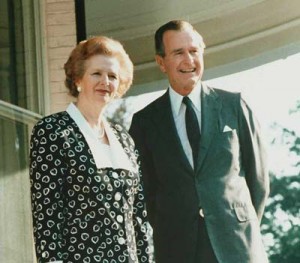
A few days ago, I wrote an “urgent” post following the death of Margaret Thatcher on my blog (in Spanish). In it, I said that I would talk about her again. After waiting a prudent amount of time, I am writing this post taking into account various things that have been said about her – not, of course, the insults, nor the songs celebrating her death, which seem to me posthumous tributes, although in bad taste. Certainly, she did many things badly; here I will discuss what, in my opinion, deserves to be remembered.
In politics, she should be remembered for her faith in parliamentarian democracy and in responsibility (and the duty of being accountable) of representatives elected by the House of Commons; and her courage and decision in undertaking reforms that she knew were going to receive criticism and violent reactions. Of course, she received the support of her voters, which she always kept in mind, as one commenter said, that “at the beginning of 1979, the United Kingdom was a terrible place to live. Thousands of workers in the public sector were on strike, truck drivers refused to transport fuel for heaters, which caused thousands of schools to close; the deceased could not be buried in Liverpool because of the grave diggers strike…”
In her economic policies, she confronted socialism, but Princeton Professor Harold James also recalled that she fought against the “establishment.” As The Economist said, “the essence of Thatcherism was the opposition of the status quo and a commitment to liberty (…) She thought that nations could only be great if individuals feel free. Her battles had one theme: the right of individuals to lead their own lives, with all the freedom possible in respect to the micromanagement of the State.”
Her policies were countercultural in Great Britain at the end of the 70s: the fight against inflation with a rigorous monetary policy; a reduced role of the State and the fight against the public deficit; privatizations; the fostering of competition, going beyond nationalist biases (these were the years when Japanese industry chose Great Britain as the headquarters for business activities in Europe, having a great impact on competition and development for British industry).

I already noted a few days ago that in order to judge her policies, you must take into account her environment. Following her death, the Financial Times recalled that “in 1979, the UK was a nation ossified by nationalized utilities, punitive tax rates, foreign exchange controls, over-mighty trade unions and a sleepy financial centre.” It added that “by 1990, all of this had been turned upside down” to the point that the Labor party became converted to the Thatcherite “heresy.”
“Reducing Thatcher to economic ideology also misses the larger purpose of her premiership. She wanted the material reforms to do something intangible – to change her nation’s culture and temperament. Her legacy is not order – though that was a precious achievement in a country struggling to govern itself – but freedom,” the FT said. “‘The economy is the method,” she once said. “The object is to change the heart and soul.’”
She provided many reasons for enemies to celebrate her death. They accuse her, for instance, of increasing income inequality; and maybe because she did not know how, or did not want to, or did not present alternatives to the decline in the mining regions of the North. They also accuse her of having destroyed the social welfare system, although the Financial Times confirms that “Thatcher was a pragmatic politician who showed little interest in embarking on politically suicidal attempts to demolish pillars of the welfare state…”
I am not one who can judge this, although in view of the reactions of various left-leaning Spanish media outlets, it seems that they were hurt more by her challenging the arrogance of unions and favoring an ideology that does not sit well with certain interventionist attitudes. As one Spanish journalist stated after her death, she was responsible for “the privatization of companies that had been nationalized, the deregulation of markets – both financial and labor; State welfare cuts and curbing a European Union that was a political project.” Unless we judge these crimes with ideological arguments, such criticisms do not seem to be justified. Certainly her example spread and other countries incurred in these “liberal sins,” starting with ex-Communist Europe. And of course, this has been censored by some on the left. “What Thatcher really destroyed was corporatism, the clunky co-stewardship of the economy by government, trade unions and industrial nabobs,” said Janan Ganesh in the Financial Times.
This is true, but “weeds never die” and now there other no-less dangerous chums on the islands and also in our country.


